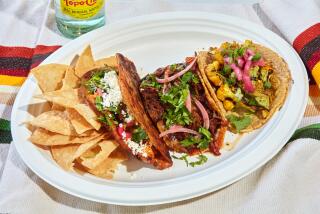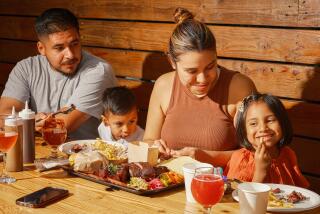The Great Outdoors : Cooking With a Happy Camper
Food always tastes better on a camping trip.
To some, this is a mandate to eat more poorly than ever. Why fuss when for once, wienies, Kraft macaroni and Spaghetti-O’s actually seem edible? Consider, too, the marshmallow, a food with no organic counterpart: The only time it is consumed by adults is around a campfire in the Great Outdoors.
It has always been my contention that if a marshmallow is palatable on a campout, really good food is transcendental.
I learned this from my parents, who often took my sister and me on three-month camping trips. I remember fresh king crab while tenting near Homer, Alaska; blueberries as large as grapes on the Olympic Peninsula. On my 12th birthday, we were in the Yukon Territory and my mother, an adventurous camp cook, made a stew with moose meat she’d purchased from a hunter earlier in the day. Mom and Dad knew the pleasures of searching out local specialties.
Maybe this is why, when possible, I eat the food of the region in which I’m camping. Beside a lake in Iowa once, I ate a dinner of sweet corn and catfish, both harvested within the hour. And I still remember eating artichokes from Castroville while camped at Big Sur, and fresh-caught bass on Santa Cruz island.
People invariably say that they eat far better camping with me than they do in their own homes. To tell the truth, I do too--there’s something about fresh air that brings out a rabidity for food preparation which I otherwise don’t exhibit.
When I pack a camping grub box, I don’t stint on the staples. My essentials include a good olive oil, fresh-roasted coffee, crusty bread and one jar of a particularly wonderful jam--camping is the one time I allow myself the luxury of shopping and consuming like a . . . well, like a yuppie. Because I usually go car-camping (as opposed to backpacking), I don’t make any effort to avoid bulky items. I take as much fresh meat and produce as possible. And, sticking by my local-is-best theory, I stop at roadside produce stands and U-pick orchards. Sometimes I’ll fish for trout or pick wild berries.
Recently I put together a grub box of Los Angeles local specialties--fresh-squeezed orange juice, fresh-made sausages, fresh-picked herbs--in other words, I spent too much money in the gourmet section of my neighborhood supermarket. I consoled myself with the knowledge that most of the dry goods I bought would last through several more camping trips.
I set out with my friend Kirk toward the Sierras, near the small town of Lone Pine. We drove for about four hours until we came to the Owens Valley, a bleak, dramatic, dry part of the planet. Near Lone Pine, we turned left up a dirt road which took us up to a tree-filled crease in the eastern side of the southern Sierra Nevada. Several miles up, we made camp in an unimproved campsite under a big old oak near a very loud, very cold stream. By unimproved, I mean that there was nothing furnished for the camper but a fire pit built with rocks and an area of dirt that somebody had half-heartedly leveled off for a tent. The only running water was in the stream. There were no toilets. No tables. No fees. “We are camping,” said Kirk. “We are not picnicking.”
After we pitched the tent, we dragged several huge, heavy rocks to camp and constructed a stone platform for the Coleman stove. We stuck mineral water to cool in the stream. We walked on thousands of acorns. Ankle deep in places, they were like oblong, wooden marbles with furry blonde caps. I considered shucking a few hundred of them, boiling them to leach out the bitter tannin, then drying and grinding them into flour for pancakes in the morning. But I had already brought David’s Goodbatter 100% organic buckwheat buttermilk pancake mix, so this time, I let the acorns be. The oak tree formed a broad canopy over us, an effect that partially resulted from previous campers hacking away all branches within axe-length for firewood. In fact, virtually every twig of dry wood within easy reach had met a similar fate, a circumstance that, luckily, I had learned to anticipate.
Throughout my childhood, we never carried our own wood. I know this because my sister and I were the designated wood gatherers. Times have changed, however, and it’s now essential to pack as much firewood as possible. If you forget, there’s usually expensive wood available at the town nearest your campsite. (In Lone Pine--an aptly named, mostly treeless desert town--we spotted pricey bundles of imported tinder-dry pine at a supermarket near the local ranger station where we obtained a fire permit.)
At home, I had washed all the lettuce and vegetables, chopped and bagged several onions, and put the chicken in a marinade of olive oil, fresh oregano and lemon. All we had to do at the campsite was dress the salad, skewer the vegetables and cook them with the chicken over the rapidly cooling coals. I chopped vegetables on a cutting board I’d placed on a low rock. Although I can’t do it painlessly for any long period of time, I find something eminently satisfying about working at a crouch, near to the ground, just feet away from a thundering stream, an oak-limb-and-leaf ceiling overhead.
In some cultures, daily food preparation is done by women, while men take charge of the celebratory and ceremonious meals. In our culture that means men barbecue. On this camping trip, it meant I had domain over the campstove and Kirk had domain over the fire. If I approached the fire, let alone suggested a skewer might need turning, he snarled and drove me off. This worked out fine: He produced a platter of succulent chicken and roasted vegetables. In the morning I’d show him a thing or two about breakfast.
Before going to sleep that night, Kirk and I made a deal. He would get up in the morning, build the fire, and put the water on to boil . . . if I would get up and make the coffee. I awoke that chilly morning to the snapping of the fire. Never had a sleeping bag felt so snug. But a deal’s a deal. I made a blend of Ethiopian Yrigacheff and Java decaffeinated (so we could drink several cups without talking each other to death). Of all the wonderful things we ate and drank on the trip, nothing rivaled that first hot cup of coffee by the campfire.
The other truly great thing about camping breakfast is basted eggs. I mean real basted eggs. Not eggs that you throw a drop of water on and cover for a moment, but eggs that are sputter-fried in bacon fat and also basted with bacon fat, eggs whose whites get bubbly and almost tough, whose yolks get so thick and rich you can feel your blood slow as you eat them. In good conscience, we only basted eggs one day; the next morning, Kirk grilled spicy Cajun sausages over the fire and I made those buckwheat flapjacks.
For lunches, we brought portable food, food that required no cooking. The second day, we hiked up the stream’s canyon, gradually coming first into pinyon, then ponderosa pines. We climbed until the temperature dropped, until we found a few vestigial icicles hanging from the roots of trees exposed by the stream and a single patch of snow unmelted in deep shade. We unshouldered our day packs, sat on huge white slabs of rock by the stream, ate cheese and cold apples, good dry salami, homemade gorp, and bittersweet chocolate, all of which tasted particularly excellent, chased as it was with fresh air and alpine sunlight. The happiest of animals, we stretched out and napped in the sun before the long hike home.
By dinner time, despite compulsive gorp consumption, we were so ravenous, the steak looked just fine raw. Nevertheless, Kirk built a fire and this time put on some oak he’d gathered from the far side of the stream. We poured olive oil on radicchio and Belgian endive halves and grilled them. We skewered raw garlic and mushrooms and grilled them. We cooked a pound-and-a-half Porterhouse medium rare. I made a cold salad of canned corn, canned cannellini beans, red onion, basil and vinaigrette. We pulled chilled mineral water from the stream. So much food, so much food, we kept chanting, but we ate all of it, except part of the salad that alone could have fed four.
Indeed, back home, on a socked-in, smoggy day, I ate some of the salad, I drank coffee made from the same mix of beans, I ate a handful of gorp and some of the good French Roquefort. It was all fine food, but somehow, without the spicy smoke, the clamorous stream and the sharp, clean air, it just didn’t taste the same.
More to Read
Sign up for The Wild
We’ll help you find the best places to hike, bike and run, as well as the perfect silent spots for meditation and yoga.
You may occasionally receive promotional content from the Los Angeles Times.






